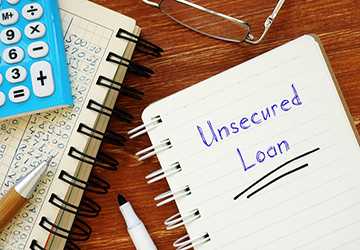With an unsecured loan, you don't need to deposit any property or other valuables as collateral. Instead, loan repayment only depends on the borrower's good credit history and ability to repay the loan.
Personal loans are a common type of loan in this category. You can usually borrow up to $50,000 on an unsecured personal loan. Repayment is made in monthly payments over a certain number of years. Banks, credit unions, and Internet lenders all offer these services.

How Unsecured Loans Work
Unsecured loans, also known as signature loans or personal loans, do not require collateral to authorize. The usual practice is that the borrower's creditworthiness determines the loan's terms, from approval to actual financing.
Unsecured loans usually require customers to have excellent credit ratings. Unsecured loans are the opposite of secured loans, which require the borrower to provide collateral to obtain financing. The collateral provided adds to the "security" of the lender's loan. Mortgages and auto loans are common types of secured loans.
Lenders can accept co-signers of borrowers with poorer credit ratings for unsecured loans, although unsecured loans have higher credit requirements than secured loans. In the event of default by the borrower, the co-signer assumes full responsibility for the debt. A default occurs when a debtor fails to pay interest and principal on a loan or bond.
Types of Unsecured Loans
Personal loans, student loans, and most credit cards are unsecured loans. These can be revolving loans or fixed-rate loans. Revolving credit is a line of credit that allows you to borrow a specified amount of money, then spend, repay, and borrow that money again.
Credit cards and personal lines of credit are both revolving unsecured loans. In contrast, a term loan has repayments over some time or even monthly. Although secured loans are often associated with term loans, there may also be unsecured ones.
The unsecured lending industry has grown in recent years, thanks partly to fintech. For example, Internet and mobile lending platforms that support peer-to-peer transactions have increased in the past decade.
Short-Term Loans vs. Unsecured Loans
Payday lenders and merchant cash advance providers are two examples of alternative lenders. Unlike home and auto loans, secured by tangible assets, these loans have no security. However, these creditors resort to other means to ensure repayment.
For example, lenders sometimes require consumers to provide their bank account information or present a postdated check in the short-term loan industry. Lenders that offer cash advances to online merchants sometimes require borrowers to repay them for online sales through payment processors such as PayPal.
Unsecured Loan Standards
Personal loan criteria can vary from lender to lender. However, lenders typically look at your credit rating, salary, and debt-to-income ratio to decide whether they should give you a loan.

Credit history
Approval for an unsecured loan depends heavily on the borrower's credit history, usage, and history. The information you provide will influence the potential credit offered to you by a lender. If you have a poor credit score, it may be wise to improve your credit score before applying for a large unsecured loan. With LendingTree, you can check your credit score for free.
Income
Lenders reviewing your unsecured loan application require assurances from you that you will not default on your repayments. Therefore, you need to disclose your financial situation—the interest rate you are entitled to may depend on your income level.
Debt to Annual Income Ratio
Your income and debt-to-income ratio may be considered when considering an unsecured loan. The debt-to-income ratio describes this situation. If your DTI ratio is low, lenders will give you good marks. Many financial institutions, such as Happy Money, look at your DTI ratio when deciding whether to lend you a loan.
To consider
A lender's decision to grant or decline an unsecured loan depends on the lender's assessment of your creditworthiness; however, borrowers are protected by law from unfair lending practices. For example, the Equal Credit Opportunity Act of 1974 prohibits lenders from considering a borrower's race, color, sex, religion, or other noncredit-related criteria when deciding whether to extend credit.




